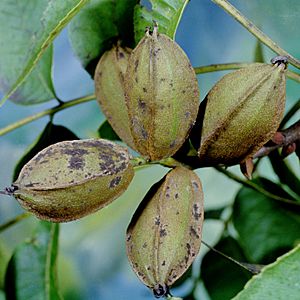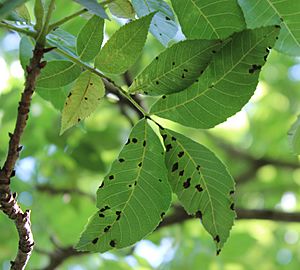Pecan scab facts for kids
Pecan scab is a serious plant disease that mostly affects pecan trees. It's a big problem for pecan growers in the southeastern United States. This disease is caused by a tiny fungus called Venturia effusa.
This fungus attacks many parts of the pecan tree. It creates dark spots, called lesions, on twigs, leaves, nuts, and the outer shells (shucks). These spots can cause parts of the tree to die. The disease starts in early spring and can keep spreading until late summer.
The pecan scab fungus spreads easily through wind and rain. It moves from infected trees to healthy ones. Farmers try to control this disease using special sprays called fungicides. They also keep orchards clean and sometimes prevent infected trees from being moved.
Since it was first found in 1882, the pecan scab fungus has been given many different names. Some of these old names include Fusicladium caryigenum and Cladosporium effusum.
How Pecan Scab Spreads and Grows
Pecan scab loves wet weather. For the fungus to infect a pecan tree, there needs to be a period of rain or high moisture. It's not just about how much rain falls, but how often it rains and how long the leaves and fruit stay wet.
For example, a rain shower just before night is perfect for the fungus. This is because the plant stays wet all night, giving the fungus more time to infect it. The temperature is also important, but less critical than wetness. The fungus grows best in warm spring and summer temperatures, usually between 20–30° Celsius (68–86°F).
Certain farming practices can also help the fungus grow. If pecan trees are planted too close together, or have low branches and thick plants growing on the ground, it can make the air around them more humid. This humid environment is great for the pecan scab fungus.
Why Pecan Scab Matters to Farmers
Pecan scab is the most damaging disease for pecan trees in the southeastern United States. This area is one of the biggest pecan-growing regions in the world. When the disease infects the leaves, shucks, and nuts, it means fewer good quality pecans are harvested.
Farmers also have to spend a lot of money on fungicides to fight the disease. This extra cost makes it harder for them to earn a profit. Because of these costs, smaller farms or even people with just a few pecan trees in their yard might not be able to grow high-quality nuts.
Pecans are a valuable crop. A single pecan tree can produce about 40–50 pounds of nuts. If a farm has many trees, this can add up to a lot of money. However, diseases like pecan scab can cause huge losses. For instance, in 2013, farmers expected to harvest about 90 million pounds of pecans. But because of bad weather that helped pecan scab grow, they only harvested 65 to 70 million pounds.
This shows how much a disease like pecan scab can hurt farmers and the economy. It can lead to big financial losses for growers and the whole farming industry.
 | William L. Dawson |
 | W. E. B. Du Bois |
 | Harry Belafonte |



